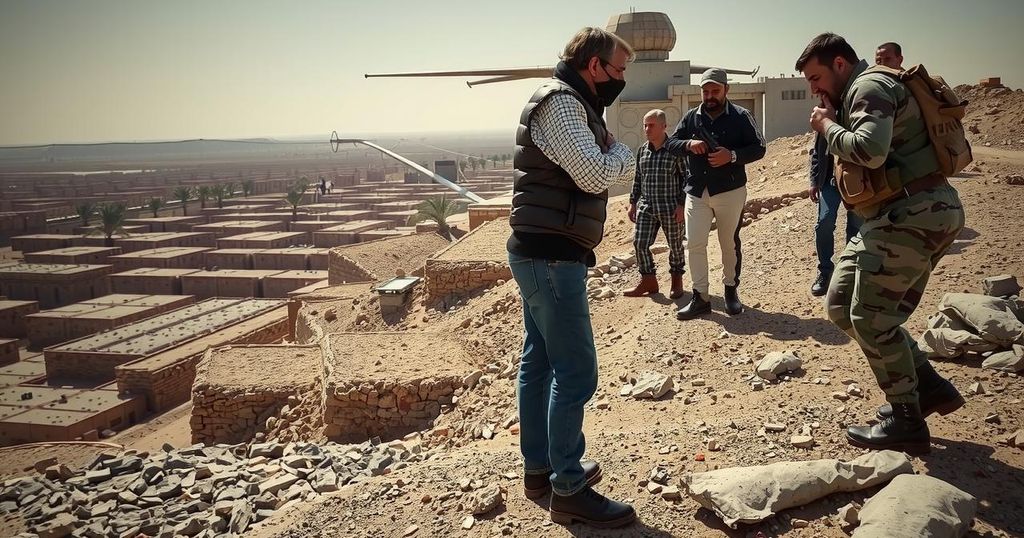Kurds in Syria seek substantial support from Israel amid fears of renewed Turkish military aggression. Following discussions about international responsibilities towards minority protection, Kurds express hope for action rather than mere statements. Historically, they have faced displacement, and with the involvement of factions like the SNA, their situation remains dire. The Kurdish community, represented by the SDF, calls for reliable allies to ensure their safety in a volatile landscape.
In recent discussions, Kurds in Syria expressed their deep concerns about the threats they face, particularly in relation to Turkey’s potential military actions. Following a meeting on December 18 between Israeli Foreign Minister Gideon Sa’ar and Jens Plotner, Foreign Policy and Security Advisor to the Chancellor of Germany, Sa’ar highlighted the necessity of international support for minority groups in Syria, including the Kurdish community. These Kurds are hopeful that Israeli statements will translate into tangible support rather than mere rhetoric.
With memories of Turkey’s previous actions, particularly its assault on Afrin in 2018 that led to mass displacement, the Kurdish population in eastern Syria is apprehensive about their future. This wariness stems from fears that Turkey, benefiting from the ongoing chaos, might launch renewed offensives against Kurdish-majority towns such as Kobani. The hostility towards Kurds is compounded by Turkey’s backing of extremist factions under the guise of fighting terrorism, leaving the Kurdish community vulnerable.
The Syrian Democratic Forces (SDF), primarily consisting of Kurdish fighters and supported by the United States, have proven effective against ISIS, capturing key territories like Kobani and Raqqa. However, this effectiveness has drawn Turkey’s ire, as Ankara equates the SDF with the Kurdistan Workers Party (PKK) and perceives them as a national threat. Incidents of cross-border attacks from Turkey, including drone strikes and artillery fire from Turkish-backed militias, exacerbate the situation.
In light of these challenges, the Kurds are particularly curious about Israel’s potential role in their defense. They have expressed a desire for Israel to provide direct support to the SDF, particularly given the grim backdrop of Turkish and other regional threats looming over their communities. Although there are whispers of possible coordination between Israel and the SDF, many Kurds are left wondering about the seriousness of Israel’s commitment to their cause. They are inquiring, “Will Israel save us?” as they seek a guarantee of protection against ongoing aggressions.
As they navigate the shifting landscape influenced by the potential resurgence of the Syrian government and the ongoing presence of ISIS, the SDF and the broader Kurdish community ardently require allies. The support from Israel—if manifested—could serve as a crucial deterrent against Turkey’s advances and help secure a peaceful coexistence for Kurds in Syria. The situation remains precarious, with many wishing for a reliable international ally to bolster their security amidst escalating violence from various factions.
The current landscape for the Kurdish community in Syria is precarious, characterized by a series of military threats primarily from Turkey. The rise of the Syrian Democratic Forces (SDF) in combating ISIS has placed the Kurds in a position of Temporary strength, but this has also attracted hostility from Ankara. The recent diplomatic discussions involving Israel signal a potential pivot in international support for the Kurdish population, who have long sought to solidify their rights and safety in a region marked by ethnic conflict and political upheaval. Understanding the historical context of Kurdish displacement and aggression from neighboring powers is essential for grasping the urgency of their plight.
In summary, the Kurdish community in Syria seeks more than verbal declarations of support; they yearn for concrete actions that ensure their safety against the Turkish offensive. With Israel’s potential backing viewed as critical, the dialogue around international support emphasizes the need for tangible commitments to protect minorities like the Kurds. The continued existence and stability of Kurdish territories will greatly depend on the international community’s response to the threats they face.
Original Source: www.jpost.com






